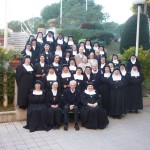
 St. Francis de Sales had a deep devotion to St. Joseph. The scholar, Father Joseph Chorpenning, OSFS, has written about this in a chapter entitled, “St. Joseph in the Spirituality of Teresa of Avila and of Francis de Sales:Convergences and Divergences, published in the book: The Heirs of St. Teresa of Avila: Carmelite Studies ix:Defenders and Disseminators of the Founding Mother’s Legacy, edited by Christopher C. Wilson, 2006.
St. Francis de Sales had a deep devotion to St. Joseph. The scholar, Father Joseph Chorpenning, OSFS, has written about this in a chapter entitled, “St. Joseph in the Spirituality of Teresa of Avila and of Francis de Sales:Convergences and Divergences, published in the book: The Heirs of St. Teresa of Avila: Carmelite Studies ix:Defenders and Disseminators of the Founding Mother’s Legacy, edited by Christopher C. Wilson, 2006.
The chapter may be read here:
As we prepare to celebrate the Feast of St Joseph on March 19th we offer some excerpts from this work for your meditation and knowledge.
St. Francis de Sales learns about St. Joseph
“It is likely that Francis first encountered St. Joseph in …. the liturgy, since the feast of St.Joseph had been celebrated in Francis’s native diocese of Geneva since 1440.
 Another place was the churches of Annecy. The church of Saint Maurice had a chapel dedicated to St. Joseph that dated to 1581, and the church of Notre-Dame had a chapel to the saint from 1586.20 (… as bishop of Geneva, Francis built the church of St. Joseph in Annecy that was attached to the first monastery of the Visitation Order,blessing its cornerstone in 1614 and solemnly consecrating it in 1618.)
Another place was the churches of Annecy. The church of Saint Maurice had a chapel dedicated to St. Joseph that dated to 1581, and the church of Notre-Dame had a chapel to the saint from 1586.20 (… as bishop of Geneva, Francis built the church of St. Joseph in Annecy that was attached to the first monastery of the Visitation Order,blessing its cornerstone in 1614 and solemnly consecrating it in 1618.)
Another “place” where Francis met St. Joseph was in St. Ignatius Loyola’s Spiritual Exercises , which he made annually throughout his life.In the meditations on the infancy and hidden life of Christ that precede the great meditation on the Two Standards during the second week, Francis would have constantly been in the company of St. Joseph.
Francis’s spiritual reading would have also nurtured his relationship with and insights into St. Joseph.Besides learning of Teresa’s devotion in her writings and Ribera’s biography, Francis would have known the prolific writings on St. Joseph by Gerson, for whom the bishop had great esteem and admiration.”
St Francis de Sales’ Theology of St. Joseph
“The theme of St Joseph’s omnipotent intercessory power is also in the forefront of Francis’ theology of the saint, epitomized by his sermon on “The Virtues of St. Joseph” of 1622- one of the most famous ever preached on the saint.Preaching in the Church of St Joseph in Annecy, where both his Visitation Sisters, within the cloister choir, and the laity, in the body of the church, worshipped, Francis solemnly proclaims,
“What more remains for us to say now, except that we cannot doubt at all that this glorious saint has great influence in heaven…Oh how happy shall we be, if we can merit a share in his holy intercession! for nothing will be refused him, either by Our Lady, or by her glorious Son. He will obtain for us, if we have confidence in him, a holy growth in all kinds of virtues, but especially in those that we have found that he possessed in a higher degree than any others, which are most holy purity of body and mind, the most lovable virtue of humility,constancy, courage and perseverance: virtues which will make us victorious in this life over our enemies and which will make us merit the grace to go and enjoy in eternal life the rewards prepared for those who shall imitate the example given them by St Joseph while he was in this life, a reward that will be nothing less than eternal happiness, in which we shall enjoy the luminous vision of the Father, of the Son, and of the Holy Spirit.
St. Joseph and the Visitation Order which St Francis de Sales Founded
 Francis founded the Visitation Order for women who wanted to live a hidden life or great devotion, but lacked the hardy constitution required to sustain the rigorous lifestyle of established monastic orders, such as Carmel. To underscore that hiddenness was the hallmark of the Visitation, Francis incorporated Colossians 3:3 into the profession ceremony: “You have died, and your life is hidden with Christ in God.”
Francis founded the Visitation Order for women who wanted to live a hidden life or great devotion, but lacked the hardy constitution required to sustain the rigorous lifestyle of established monastic orders, such as Carmel. To underscore that hiddenness was the hallmark of the Visitation, Francis incorporated Colossians 3:3 into the profession ceremony: “You have died, and your life is hidden with Christ in God.”
Jane de Chantal attests that she meditated on this verse day and night,praying for the grace of a hidden life for her and the order. Thus, the Visitation sought, above all, to imitate Jesus’ hidden life, and St. Joseph,to whom this phase of the Savior’s life was entrusted, perfectly modeled for these women this essential quality of their vowed life and vocation..It is not a coincidence that Francis appeals to Colossians 3:3 as the lens through which he views the mystery of the essential hiddenness of St. Joseph’s life and virtues. For Francis, St. Joseph modeled the hidden ordinary, everyday virtues, what the bishop called the “little virtues,”which are the very heart and essence or true devotion: purity of mind and body, poverty, humility before God, gentleness toward neighbor,constancy, courage, perseverance, obedience to the Word of God, charity of judgment (cf. Introduction to the Devout Life , Pan 3, chs. 1-2).
 St. Joseph and the Salesian Spiritual Vision
St. Joseph and the Salesian Spiritual Vision
As is well known, Francis insisted on the universal call to holiness four centuries before the Second Vatican Council (1962-65). He envisioned that the Church would be renewed by the cumulative effect of each person responding to this call by the faithful and loving fulfillment of the ordinary, day-to-day duties and responsibilities of his/her state of life, whether as married or single person, cleric, or vowed religious. The Salesian spiritual vision, therefore, was larger than the Visitation Order.
For Francis, St. Joseph, specifically in his virtues, perfectly models the Salesian spiritual vision, making him the first “Salesian saint.”